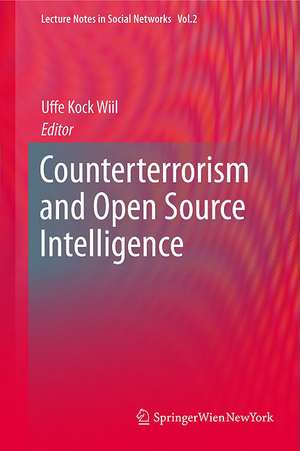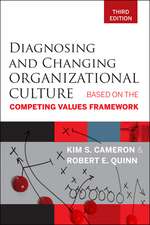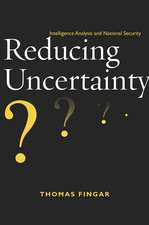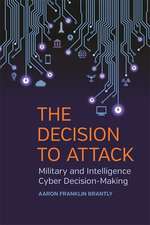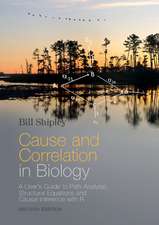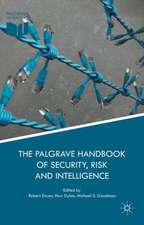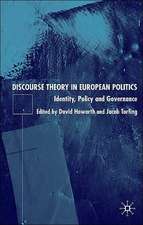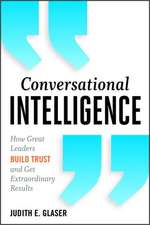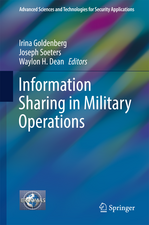Counterterrorism and Open Source Intelligence: Lecture Notes in Social Networks
Editat de Uffe Wiilen Limba Engleză Hardback – 29 iun 2011
| Toate formatele și edițiile | Preț | Express |
|---|---|---|
| Paperback (1) | 996.07 lei 6-8 săpt. | |
| SPRINGER VIENNA – 3 aug 2013 | 996.07 lei 6-8 săpt. | |
| Hardback (1) | 999.85 lei 3-5 săpt. | |
| SPRINGER VIENNA – 29 iun 2011 | 999.85 lei 3-5 săpt. |
Din seria Lecture Notes in Social Networks
- 20%
 Preț: 655.35 lei
Preț: 655.35 lei - 20%
 Preț: 990.80 lei
Preț: 990.80 lei - 18%
 Preț: 1003.38 lei
Preț: 1003.38 lei - 18%
 Preț: 917.05 lei
Preț: 917.05 lei - 20%
 Preț: 337.52 lei
Preț: 337.52 lei - 20%
 Preț: 649.28 lei
Preț: 649.28 lei - 20%
 Preț: 996.07 lei
Preț: 996.07 lei - 15%
 Preț: 503.83 lei
Preț: 503.83 lei - 18%
 Preț: 998.66 lei
Preț: 998.66 lei - 18%
 Preț: 728.74 lei
Preț: 728.74 lei - 20%
 Preț: 991.60 lei
Preț: 991.60 lei - 18%
 Preț: 1106.00 lei
Preț: 1106.00 lei - 20%
 Preț: 668.57 lei
Preț: 668.57 lei - 5%
 Preț: 349.68 lei
Preț: 349.68 lei - 20%
 Preț: 339.14 lei
Preț: 339.14 lei - 20%
 Preț: 587.59 lei
Preț: 587.59 lei - 15%
 Preț: 644.82 lei
Preț: 644.82 lei - 20%
 Preț: 628.52 lei
Preț: 628.52 lei - 15%
 Preț: 587.72 lei
Preț: 587.72 lei - 20%
 Preț: 648.44 lei
Preț: 648.44 lei - 20%
 Preț: 570.97 lei
Preț: 570.97 lei - 20%
 Preț: 642.52 lei
Preț: 642.52 lei - 20%
 Preț: 655.02 lei
Preț: 655.02 lei - 15%
 Preț: 643.34 lei
Preț: 643.34 lei - 20%
 Preț: 764.43 lei
Preț: 764.43 lei - 20%
 Preț: 649.93 lei
Preț: 649.93 lei - 20%
 Preț: 649.60 lei
Preț: 649.60 lei - 20%
 Preț: 650.08 lei
Preț: 650.08 lei - 20%
 Preț: 889.62 lei
Preț: 889.62 lei -
 Preț: 389.11 lei
Preț: 389.11 lei -
 Preț: 395.09 lei
Preț: 395.09 lei - 20%
 Preț: 649.75 lei
Preț: 649.75 lei - 20%
 Preț: 924.53 lei
Preț: 924.53 lei - 20%
 Preț: 341.95 lei
Preț: 341.95 lei - 20%
 Preț: 992.76 lei
Preț: 992.76 lei - 20%
 Preț: 934.03 lei
Preț: 934.03 lei - 15%
 Preț: 641.03 lei
Preț: 641.03 lei
Preț: 999.85 lei
Preț vechi: 1249.82 lei
-20% Nou
Puncte Express: 1500
Preț estimativ în valută:
191.34€ • 199.51$ • 159.02£
191.34€ • 199.51$ • 159.02£
Carte disponibilă
Livrare economică 28 februarie-14 martie
Preluare comenzi: 021 569.72.76
Specificații
ISBN-13: 9783709103876
ISBN-10: 3709103878
Pagini: 508
Ilustrații: XVIII, 458 p. 182 illus.
Dimensiuni: 155 x 235 x 32 mm
Greutate: 0.77 kg
Ediția:2011
Editura: SPRINGER VIENNA
Colecția Springer
Seria Lecture Notes in Social Networks
Locul publicării:Vienna, Austria
ISBN-10: 3709103878
Pagini: 508
Ilustrații: XVIII, 458 p. 182 illus.
Dimensiuni: 155 x 235 x 32 mm
Greutate: 0.77 kg
Ediția:2011
Editura: SPRINGER VIENNA
Colecția Springer
Seria Lecture Notes in Social Networks
Locul publicării:Vienna, Austria
Public țintă
ResearchCuprins
Counterterrorism and Open Source Intelligence: Models, Tools, Techniques, and Case Studies (Uffe Kock Wiil)
Part I Models
Targeting by Transnational Terrorist Groups (Alexander Gutfraind)
A Framework for Analyst Focus from Computed Significance (David Skillicorn and M.A.J. Bourassa)
Interdiction of Plots with Multiple Operatives (Gordon Woo)
Understanding Terrorist Network Topologies and their Resilience against Disruption (Roy Lindelauf, Peter Borm, and Herbert Hamers, Patricia L. Brantingham, Martin Ester, Richard Frank, Uwe Glässer, and Mohammad A. Tayebi)
Part II Tools and Techniques
Region-based Geospatial Abduction with Counter-IED Applications (Paulo Shakarian and V.S. Subrahmanian)
Finding Hidden Links in Terrorist Networks by Checking Indirect Links of Different Sub-Networks (lan Chen, Shang Gao, Panagiotis Karampelas, Reda Alhajj, and Jon Rokne)
The Use of Open Source Intelligence in the Construction of Covert Social Networks (Christopher J. Rhodes)
A Novel Method to Analyze the Importance of Links in Terrorist Networks (Uffe Kock Wiil, Jolanta Gniadek, and Nasrullah Memon)
A Global Measure for Estimating the Degree of Organization and Effectiveness of Individual Actors with Application to Terrorist Networks (Sara Aghakhani, Khaled Dawoud, Reda Alhajj, and Jon Rokne)
Counterterrorism Mining for Individuals Semantically-Similar to
Watchlist Members (James A. Danowski)
Detection of Illegitimate Emails using Boosting Algorithm (Sarwat Nizamani, Nasrullah Memon, and Uffe Kock Wiil)
Cluster Based Text Classification Model (Sarwat Nizamani, Nasrullah Memon, and Uffe Kock Wiil)
Effectiveness of Social Networks for Studying Biological Agents and Identifying Cancer (Ghada Naji, Mohamad Nagi, Abdallah M. ElSheikh,Shang Gao, Keivan Kianmehr, Tansel Özyer, Jon Rokne, Douglas Demetrick, Mick Ridley, and Reda Alhajj)
Part III Case Studies
From Terrorism Informatics to Dark Web Research (Hsinchun Chen)
Investigating Terrorist Attacks using CDR Data: A Case Study (Fatih Ozgul, Ahmet Celik, Claus Atzenbeck, and Nadir Gergin)
Multilingual Real-Time Event Extraction for Border Security Intelligence Gathering (Martin Atkinson, Jakub Piskorski, Erik Van der Goot, and Roman Yangarber)
Mining the Web to Monitor the Political Consensus (Federico Neri, Carlo Aliprandi, and Furio Camillo)
Exploring the Evolution of Terrorist Networks (Nasrullah Memon, Uffe Kock Wiil, Pir Abdul Rasool Qureshi, and Panagiotis Karampelas)
Part IV Alternative Perspective
The Ultimate Hack: Re-Inventing Intelligence to Re-Engineer Earth (Robert David Steele)
Part I Models
Targeting by Transnational Terrorist Groups (Alexander Gutfraind)
A Framework for Analyst Focus from Computed Significance (David Skillicorn and M.A.J. Bourassa)
Interdiction of Plots with Multiple Operatives (Gordon Woo)
Understanding Terrorist Network Topologies and their Resilience against Disruption (Roy Lindelauf, Peter Borm, and Herbert Hamers, Patricia L. Brantingham, Martin Ester, Richard Frank, Uwe Glässer, and Mohammad A. Tayebi)
Part II Tools and Techniques
Region-based Geospatial Abduction with Counter-IED Applications (Paulo Shakarian and V.S. Subrahmanian)
Finding Hidden Links in Terrorist Networks by Checking Indirect Links of Different Sub-Networks (lan Chen, Shang Gao, Panagiotis Karampelas, Reda Alhajj, and Jon Rokne)
The Use of Open Source Intelligence in the Construction of Covert Social Networks (Christopher J. Rhodes)
A Novel Method to Analyze the Importance of Links in Terrorist Networks (Uffe Kock Wiil, Jolanta Gniadek, and Nasrullah Memon)
A Global Measure for Estimating the Degree of Organization and Effectiveness of Individual Actors with Application to Terrorist Networks (Sara Aghakhani, Khaled Dawoud, Reda Alhajj, and Jon Rokne)
Counterterrorism Mining for Individuals Semantically-Similar to
Watchlist Members (James A. Danowski)
Detection of Illegitimate Emails using Boosting Algorithm (Sarwat Nizamani, Nasrullah Memon, and Uffe Kock Wiil)
Cluster Based Text Classification Model (Sarwat Nizamani, Nasrullah Memon, and Uffe Kock Wiil)
Effectiveness of Social Networks for Studying Biological Agents and Identifying Cancer (Ghada Naji, Mohamad Nagi, Abdallah M. ElSheikh,Shang Gao, Keivan Kianmehr, Tansel Özyer, Jon Rokne, Douglas Demetrick, Mick Ridley, and Reda Alhajj)
Part III Case Studies
From Terrorism Informatics to Dark Web Research (Hsinchun Chen)
Investigating Terrorist Attacks using CDR Data: A Case Study (Fatih Ozgul, Ahmet Celik, Claus Atzenbeck, and Nadir Gergin)
Multilingual Real-Time Event Extraction for Border Security Intelligence Gathering (Martin Atkinson, Jakub Piskorski, Erik Van der Goot, and Roman Yangarber)
Mining the Web to Monitor the Political Consensus (Federico Neri, Carlo Aliprandi, and Furio Camillo)
Exploring the Evolution of Terrorist Networks (Nasrullah Memon, Uffe Kock Wiil, Pir Abdul Rasool Qureshi, and Panagiotis Karampelas)
Part IV Alternative Perspective
The Ultimate Hack: Re-Inventing Intelligence to Re-Engineer Earth (Robert David Steele)
Recenzii
From the reviews:
“Informatics may be used to analyze open sources in the fight against terrorism. This state-of-the-art overview from an impressive group of international contributors is mandatory reading for criminologists and intelligence professionals. Many of the tools discussed have broad application to social network analysis. … I recommend this broad overview of state-of-the-art research.” (Brad Reid, ACM Computing Reviews, October, 2011)
“Informatics may be used to analyze open sources in the fight against terrorism. This state-of-the-art overview from an impressive group of international contributors is mandatory reading for criminologists and intelligence professionals. Many of the tools discussed have broad application to social network analysis. … I recommend this broad overview of state-of-the-art research.” (Brad Reid, ACM Computing Reviews, October, 2011)
Caracteristici
Presents state-of-the-art research and practice concerning intelligence work Detailed description of novel tools and techniques for counterterrorism open source intelligence Provides perspectives on the use of open source intelligence in the future Includes supplementary material: sn.pub/extras
